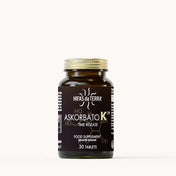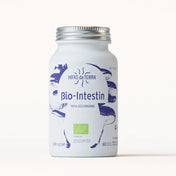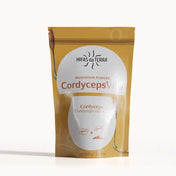What is the intestine-corebro axis?
In the past, scientists considered that the brain was the most important organ in regards to mental health. However, more and more tests begin to reveal the importance of intestinal health. It is estimated that the 90% of all mental health problems have a connection with what happens in our intestines.Posted on 05/29/2023. Author: Hifas Editorial Team
- Why is it said that the intestine is the second brain?
- How does the digestive system affect mental health and mood?
- What diseases show the brain intestine connection
- How to improve brain and intestine communication
- Serotonin and other neurotransmitters
- Change! Probiotics and other substances of interest
- References
Why is it said that the intestine is the second brain?
The axis Intestin-corebro is a communication link between the intestine and the brain. It includes four main roads that allow the brain and digestive system to send and receive signals from each other. These are the connection routes:- Neuroendocrine via - This route is the communication between the hypothalamus and he tract gastrointestinal. The hypothalamus, the part of the brain responsible for Emotions and motivation, receives cognitive and behavioral signals that affect hormones and intestinal symptoms.
- Autonomic nervous system - This route transmits brain signals to the organs of the digestive system that control digestion and is responsible for digestion -related processes, such as Production of digestive enzymes and the speed of the digestive process.
- Immune response - This route determines how the body reacts to specific foods, bacteria or viruses within the digestive system and how the body communicates those reactions to the brain. It is responsible for maintaining the balance between the immune system and the rest of the organism, since an imbalance (intestinal dysbiosis) can cause digestive problems.
- Nervous system Entrico - Finally, the enteric nervous system connects the neurons of the gastrointestinal tract with the brain and is responsible for food digestion, absorption and secretion of digestive juices in the gastrointestinal tract.
How does the digestive system affect mental health and mood?
It is important to note that the intestine-corebro axis not only has a positive effect: it is calculated that Up to 90% of all mental health problems can be attributed to gastrointestinal disorders such as Irritable intestine syndrome (SII), depression and anxiety.What diseases show the brain intestine connection?
The Depression and anxiety They are possibly two of the most common mental health problems associated with a Intestine-altered intestine axis. Studies have discovered that an unbalanced intestinal microbiota can affect the hippocampus - responsible for regulating mood -, which translates into an increase in anxiety and depression. Gastrointestinal problems with depression have also been related: Several studies have indicated that people with gastrointestinal problems are more likely to suffer depression and anxiety that do not suffer. Therefore, the connection between the intestine and the brain is complex, and the disorders caused by an alteration of the intestine-cerebro axis can be difficult to diagnose and treat. However, understand the connection between them can be beneficial To treat and, ultimately, improve mental health.How to improve brain and intestine communication
The importance of treating intestine-cerebro axis disorders is increasing in the light of recent research: since intestinal health linked to mental health is, it is increasingly crucial to understand and treat problems related to the intestine-corebro axis.GABA, serotonin and other neurotransmitters
Gamma-aminobutyric acid (GABA) is a very common amino acid in brain neurons. It is believed that neurons calms and protects our brain against stimulus overload, hence it has been related to stress reduction and sleep improvement. The investigations have revealed the role played by the microbiota in the production of GABA. The prestigious magazine Nature He informed that GABA production by a bacterium reduced pain by acting on the stomach sensory neurons. Another article, published in the same magazine, revealed a link between depression and the relative abundance of bacteria that synthesize and degrade this neurotransmitter.Change! Prebiotics and other tips
- Food Prebiotics: Prebiotics are a type of fiber that stimulates the growth of healthy bacteria. Among the foods rich in prebiotics are artichokes, bananas, fungi such as León hair (its standardized ecological extract contains GABA), the Shiitake or the Pleurotus, asparagus, oats and apples.
- Varied foods: This can lead to a diverse microbiome, which is an indicator of good intestinal health. In particular, legumes, beans and fruit contain a lot of fiber and can favor the growth of healthy bifidobacteria.
- Fermented foods: Fermented foods such as yogurt, chucrut and kefir contain healthy bacteria, mainly lactobacilos, and can reduce the number of species causing diseases in the intestine.
- Limit your exposure to stress: Uncreated stress can damage the intestine-corebro axis, as it can cause damage to both intestine neurons and in the brain hippocampus.
- Free the hormone from happiness: Regular exercise favors the release of endorphins, which can help improve mood and reduce stress levels, in addition to increasing the amount of beneficial bacteria in the intestine.
- Do not underestimate rest: Sleep badly It can have a detrimental effect on mental health and damage the intestine-corebro axis.
- Avoid the Consumption of artificial sweeteners: toLugo tests have shown that artificial sweeteners such as aspartamo increase blood sugar by stimulating the growth of unhealthy bacteria such as Enterobacteriaceae In the intestinal microbioma.
Summary: why taking care of your intestinal microbiota improvement your humor and balance your mood
In conclusion, the intestine-cerebro axis is a complex system that explains why the intestine can affect our mood. Although more research is needed to fully understand the effects of the intestine-corebro axis, it is clear that it is increasingly important to maintain a healthy intestine to preserve good mental health. Food and supplementation allow to incorporate substances involved in the intestine-corebro connection. As experts in the fungal study, we highlight that species such as pleurotus or shiitake can provide prebiotics. We also carry our own investigations to optimize the crops of other species such as León's hair in order to achieve GABA productions, a natural substance in this species.- "The intestine-cerebro axis | Mental Health America". MHA, National Mental Health Council, https://mhanation.org/gut-brain-axis.
- https://www.healthline.com/nutrition/gut-brain-connection#TOC_TITLE_HDR_3
- Tang, Joseph, et al. "Intestin-corebro axis: the link lost in depression". Nature Reviews Neuroscience, vol. 21, No. 8, June 2020, pp. 541-556., DOI: 10.1038/S41583-020-0335-Y.
- Schumann, Shan. "6 ways to heal your intestine-cerebro axis." The Chalkboard Mag, Aug 23. 2018, https://thechalkboardmag.com/heal-your-gut-brain-axis.
- https://www.verywellmind.com/what-is-the-gut-brain-axis-5272028
- 6.https://www.bbc.com/future/article/20190218-how-the-bacteria-inside-you-could-affect-your-mental-healt
- https://gutscharity.org.uk/2019/04/ibs-the-gut-brain-connection/
















